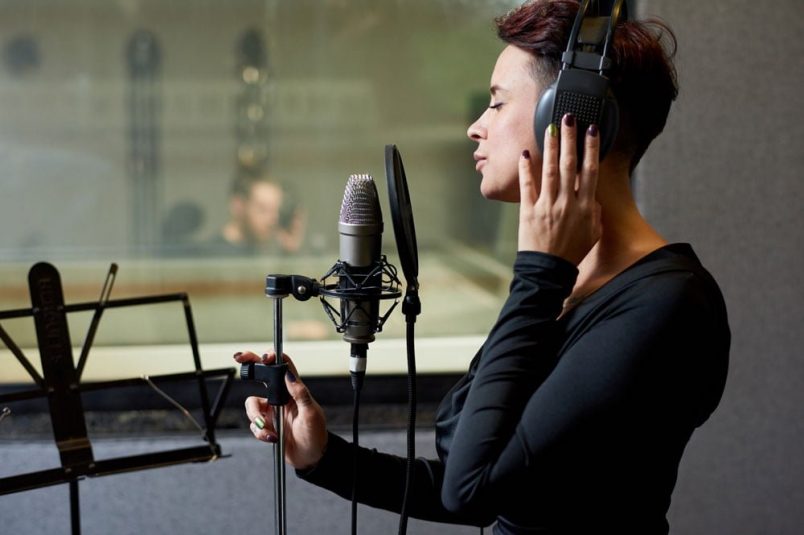Can anyone sing well?
Learning how to sing can be intimidating, especially when you have no idea where to start. Nonetheless, anyone can learn; with the right mindset, and access to the right information and materials.
Here are some tips on singing that can help bring you closer to your dream of being a performer with a world-class voice!
Vocal Tips #1
Let go of your inhibitions.
It’s hard to perform if you’re constantly worrying about other things, like if you’re making a weird face, what your mouth looks like or whether you’re being too enthusiastic, etc. Focus on pronouncing words properly, getting your pitch right, and vocalizing with enough power to get the notes out.

Many beginners find it hard to hit high notes because they require a certain degree of force and volume, and beginners may also be too shy to perform loudly. Break free of that cage! You need to be comfortable enough to belt it out loudly when the song calls for it – to not be afraid of looking silly, and to not be afraid of making mistakes. Once you stop worrying about these things, you can start making real progress.
Vocal Advice #2
Relax your tongue.
Many people have trouble with their tongue being too tense. They may unconsciously keep their tongue too rigid, or press it against their teeth or the roof of their mouth. Learn to relax your tongue and pronounce the lyrics you vocalize more clearly.
Singing Advice #3
Stay hydrated.
It’s hard to perform if your throat is dry. Take a look at professional artists performing live; many of them will take a drink of water at least once when they are on stage. Keeping yourself well hydrated helps you command better control of your vocal cords. Not to mention drinking plenty of water has numerous other health benefits too. You need at least eight glasses of water a day, so drink up!
Tips to sing better #4
Quit smoking.
While many smokers may not think that this is an option for them, it at least deserves your consideration. Smoking harms your voice in multiple ways. First of all, it damages your vocal cords. The high temperature of cigarette smoke dries out the vocal cords, making singing smoothly difficult. Smokers are also at a greater risk of developing laryngitis, and nodules which is obviously not good for any vocalist.
Lung damage from smoking will also impair your ability. Good lung capacity gives a vocalist greater power, a better ability to hold long notes, and have more vocal agility. Smoking weakens the lungs and reduces their capacity, diminishing the power of your voice to less than what you would have access to otherwise.
Singorama’s Tip #5
Listen to yourself.
What you hear and what people around you hear when you sing are different; sometimes much more different than you might think! Recording yourself helps you to take a step back and look at your work from a different perspective. You can play your recording of yourself as many times as you want, helping you see just exactly where you did good, and where you stumbled or need improvement.
Recording your voice can also be a great motivational tool when beginning to take up lessons, especially if you don’t have anyone to critique you. One thing you can do is record yourself reciting a song you want to be able to do very well. Record a new version at regular intervals, like daily or weekly, documenting your progress. This way, when you starting sounding like a pro, you can listen to your old recordings and see how much progress you’ve been making.
Singorama’s Mini Recording Studio software can help you record and play back your voice right on your computer. It also has other built-in features that can help you with your training such as pre-recorded scales to practice along with the virtual piano.

Coaching Tip #6
Feel the lyrics.
It’s much easier to sing with feeling when you can actually empathize with the song you are reciting; this way the emotions you project are authentic. Try to find out how you can relate to the song you’re performing. It doesn’t have to be literal; just try to find an emotion from yourself you feel falls in line with the song, then try to channel that emotion through your voice. If you believe what you’re performing, it becomes easier to convey the essence of your song to your listeners.

Singers advice #7
Avoid coffee and alcohol.
These beverages dehydrate you and make it harder to vocalize properly. You don’t have to abstain completely; just avoid consuming them excessively, or right before you hit the stage. If you do drink alcohol or coffee and have to perform, make sure you drink lots of water to flush them out and keep yourself well hydrated.
Song Tip #8
Find an artist whose songs are a good match for you.
Everyone has their own voice; some songs work good with certain kinds of voices. When choosing songs to recite, it can help to be familiar with some artists whose songs are more or less compatible with your voice in terms of pitch and style. While you don’t have to confine yourself to a handful of songs, it can be a great help when starting out, having a source of songs you might be comfortable with practicing. Most importantly, it also helps if you actually like the artist whose songs you’re reciting.
Singers Tip #9
Practice with an instrument .
If you already know how to play a musical instrument, then you’ve surely thought about singing along while playing. If you don’t know how to play any instruments and are willing to give some time and effort, try picking one up. Even simple percussion instruments like a tambourine can help; even snapping your fingers. Singing with accompaniment help you hone your senses of rhythm and pitch; you’ll know if you’re off-tune if you and your instrument aren’t in harmony. You can also ask a friend who plays an instrument to jam with you, or follow along to CDs and other recorded music.




